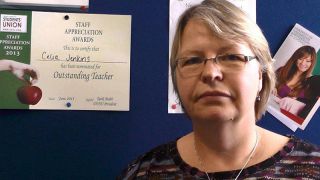Dr Celia Jenkins


I am an Emeritus Fellow in Sociology and passionate about sociology and its relevance to everyday life and struggles for social justice. My first degree in Sociology was at the University of Birmingham, followed by an MSc and PhD in Sociology of Education at the University of London, Institute of Education. I was a Principal Lecturer in Sociology and have now retired from teaching. My research is with my colleague, Dr Umit Cetin, also from Sociology and focuses around social justice issues working with and for the Alevi community in the UK and Turkey.
Membership of professional bodies:
British Sociological Association
British Educational Research Association
Fellow of Higher Education Academy
National Teaching Fellowship
Professional activities:
2018 - National Teaching Fellowship Award
2017 History, Sociology and Criminology Department Senior Tutor
2017 - University of Westminster Teaching Fellowship Award to Sociology team
2014 - Winner of Routledge prize for curriculum development between schools and universities in association with the British Curriculum Forum and British Educational Research Association.
2012-16 - External Examiner, Ruskin College, Oxford
2011 - University of Westminster Teaching Fellowship Award
2011 -2015 SSHL Disabilities Tutor
2010- 2016 SSHL Learning and Teaching group on the curriculum
2004 External Examiner for PhD Candidate, University of Bristol
2004-8 External Examiner for MA Women's Studies, University of Lancaster
2002 Fellow of Higher Education Academy
1996-1999 External Examiner in Sociology, University of Birmingham;
1997- 2014 Course Leader for Sociology
1996 HEFCE Assessor for Sociology;
1993 -7 SSHL Senior Academic Tutor
1992 -Mentor for Postgraduate Certificate/ Diploma in Higher Education
As a feminist sociologist of education, my main research interest is in education, focusing on higher education pedagogy and working with schools to address community issues. Previous research includes the historical relationship between social class and education through analysis of the international progressive New Education movement which reshaped democratic child-centred education in the interwar years, in particular forging an education by and for the professional middle-classes. Commissioned research includes action research to address the problem of advertising sexual services in London's telephone boxes. Having taught for over 25 years, I have seen many changes in Higher Education, which has given me the opportunity to research, reflect and write about teaching research methods and pedagogic rights. I was the key researcher with a national ESRC funded project on pedagogic quality and inequality in first degrees in sociology from 2008-11 which challenged the relationship between position in the league tables and quality of undergraduate sociology provision.
In 2015, I received a fellowship from the Leverhulme Trust/ British Academy to fund a transnational survey of the Alevi community in Turkey and London. The aim was to provide a comparative description of the community in both contexts and their transnational engagements. In the British context, it aimed to help raise their profile as part of their case to be counted as a distinct religious group in the census.
I continue to write and publish on pedagogic issues. From 2015-17, I was the UK lead researcher on an international, Erasmus and Turkish National Agency funded project on the graduate labour market and whether graduates are finding graduate jobs in their subject areas and developing distance learning employability modules to support students in developing graduate skills. The project included partners from Turkey, Germany and Czechia. Teaching about employability continues to be of interest in how to ensure that their degree prepares students for the graduate labour market.
Current research activities:
Since 2010, I have collaborated with my sociology colleague, Dr Umit Cetin, to work with the UK Alevi community. Our initial action research aimed to develop strategies to counter a negative sense of identity that was manifest amongst their second generation Alevi youth. Through concerted collaboration with local schools and the community, we developed curriculum units on Alevism to be taught in schools as part of the compulsory religious education curriculum from key stages 1-3. This research is ongoing as the impact of the Alevism lessons has far exceeded expectations. Our current focus is on challenges within the Alevi community to construct their religious identity in the settlement context in contrast to Turkey, where Alevism is officially recognised only as a culture and not a religion.